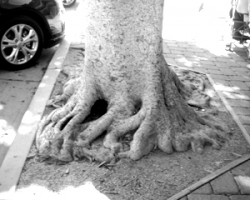The project to plant 25 ficus trees on Seal Beach’s Main Street will go forward as planned.
After nearly two-and-a-half hours of discussion, the Seal Beach City Council voted 3-2 to “receive and file” the debate over the plan at the agency’s Monday , March 26. The motion was made by Councilman Gordon Shanks.
Mayor Michael Levitt, who had asked the council to reconsider the landscaping project, and Councilman Gary Miller cast the dissenting votes.
Before the council held that vote, Levitt made a substitute motion to have staff look at what other cities did with their ficus trees. That motion failed by a vote of 2-3, with Levitt and Miller casting the votes in favor of more study.
The Main Street landscaping plan calls for the removal of trees that are not ficus and their replacement with 25 more ficus trees.
However, Levitt had opposed the selection of ficus trees since the plan first came before the council. He said he believed staff should study the issue further. He said there was no barrier that would stop the ficus from roots growing.
Supporters of the ficus selection were not moved by that argument. Councilwoman Ellery Deaton said all trees present problems. (Deaton’s guest column defending the selection of ficus for Main Street is on page 11 of this week’s Sun.)
Arborist Robert Mann of RMA International, the consulting firm that helped devise the Seal Beach Street Tree Plan, said the selection of the tree for Main Street was first made by the Tree Advisory Committee.
He said of the three trees selected, the ficus best fit the environmental conditions found on Main Street.
He said the ficus have done far better than any other tree on Main Street. He said the other trees were stunted. “Our intention was to capitalize on what you have,” he said.
Councilman Shanks asked what reasonable measures could be taken to minimize the impact of ficus trees on the street.
Mann said deep watering and root trimming would help.
Shanks asked about other trees.
Mann said the all trees will grow large roots.
Mann said you basically can’t control a living organism.
Assistant City Manager Sean Crumby, who is also director of Public Works, said the trees were rimmed annually and the pavers on Main Street were checked every Friday.
Levitt asked if the roots would grow larger as the ficus trees grow bigger.
Mann said that would eventually happen with any tree that grows tall.
Residents spoke passionately on both sides of the issue.
Part time resident Wesley Cruise said his primary home was in Whittier. He said ficus trees had been nothing but trouble in Whittier. He said they had ripped up sidewalks and broken sewer lines.
Later in the evening Mario Voce, of the Environmental Quality Control Board, said maintaining sewers was an on-going expense and that sewer lines would need to be repaired even if there were no trees. He said people blamed the trees for their problems.
Libby Applegate said she was relieved when she learned the council had originally approved the tree plan for Main Street. “I was here when the ficus trees were planted,” she said.
Main Street businessman Joe Kalmick said he thought everyone who came to the meeting loved trees. He said most people at the meeting were not aware of the issues when the master tree plan was prepared. He said most Main Street business owners were not residents.
Kalmick, a former candidate for Deaton’s District 1 council seat, also said the city would never have a uniform canopy of ficus trees, giving the difference between the ages of the existing trees and the new trees that would be planted.
Businessman, resident and activist Seth Eaker said this was a case of paralysis of analysis. He said the city appointed the tree committee.
He said if these 25 ficus trees were the city’s biggest problem, then Seal Beach was blessed. He urged the council to make a decision. “Sometimes we have to take a risk; roll the dice,” Eaker said.
Businessman Brian Kyle of O”Malley’s on Main spoke in favor of the ficus trees. “I think the ficus has done well,” he said.
Kyle said he has only had to pull up one paver for a ficus tree in 30 years.
Scott Levitt, son of Mayor Levitt and a one-time candidate for Seal Beach City Council, said it was fiscally irresponsible to replace trees that are healthy. He advised the council to have staff learn what other cities have done with ficus trees.
Jim Caviolla, of the Tree Advisory Committee, spoke in favor of the ficus. He said they tried other kinds of trees. They did not grow. He said he has spent $4,000 of his own money on trees on Ocean Avenue. He said that you either co-exist with trees on Main Street or there won’t be trees on Main street.
“This is not some new thing,” Caviolla said. He said three years ago, the city had meetings and spent $60,000 on developing the tree plan.
In all, eight citizens spoke in favor of the ficus trees. Ten individuals spoke against the trees.
Deaton said the problem trees were yesterday’s trees—they were improperly planted and improperly cared for. She said she believes the ficus trees are manageable.
Deaton argued that the problem of growing roots would be the same with any large tree, not just the ficus.
“I’ll be you if we found a better tree, we’ll probably be here arguing about that tree.
She said if there was a problem with a tree 50 years from now, take it out.
“This is investing in one of the greatest assets that we have,” she said.
She also said that all tree roots spread.
City Attorney Quinn Barrow said Seal Beach already had a contract to plant the trees. He said any change would have to be negotiated.




